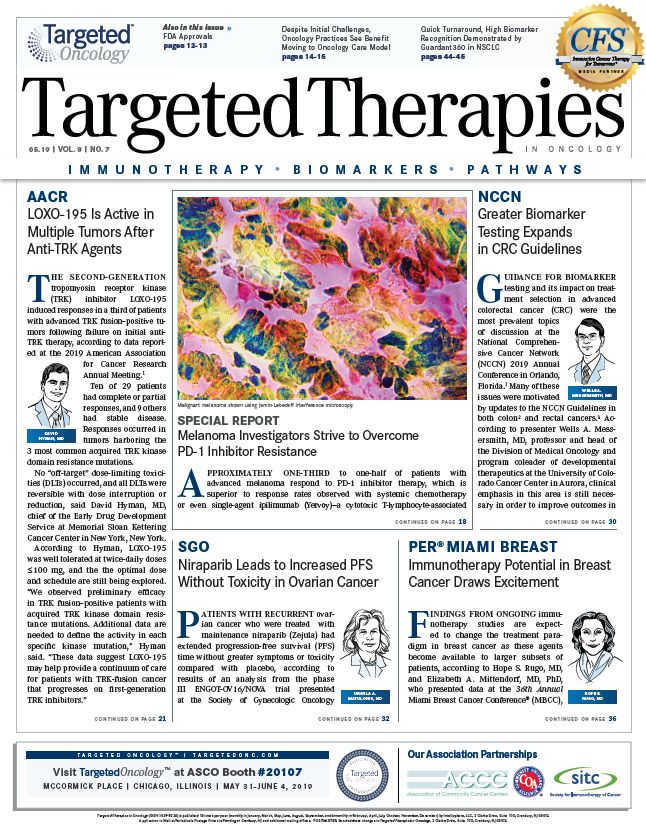Translational Immunotherapy Research Informs Ongoing Efforts to Improve Treatment Outcomes
Robert L. Ferris, MD, PhD, co-physician editor-in-chief, discusses the excitement of immunotherapy at the 2019 AACR Annual Meeting and how this research can inform resarch efforts moving forward.
Robert L. Ferris, MD, PhD
In the afterglow of the 2019 American Association for Cancer Research (AACR) Annual Meeting in Atlanta, Georgia, it seems worthwhile to highlight a series of exciting results that affect cancer research and treatment. The meeting focused heavily on immunotherapy advances in several cancers. In addition to the topics discussed in our conference coverage on pages 21 to 29 in this issue, other presentations could inform research efforts moving forward.
The use of chimeric antigen receptor (CAR) T cells may be on the horizon for solid tumors. Results of HEROS 2.0 (NCT00902044), a phase I dose-escalation clinical study by Shoba A. Navai, MD, assistant professor of hematology/oncology at Baylor College of Medicine, showed that lymphodepletion prior to HER2-targeted CAR T cells safely augments T-cell expansion and induces clinical responses in patients with advanced sarcomas. The therapy was tolerated and associated with objective clinical benefit in some patients with advanced HER2- positive sarcoma.
In a presentation on targeting multiple checkpoint receptors, Giuseppe Curigliano, MD, PhD, associate professor of medical oncology at the University of Milan and head of the Division of Early Drug Development at the European Institute of Oncology, reported on a trial investigating MBG453 and spartalizumab. These agents block the binding of immune checkpoint receptors TIM-3 to phosphatidylserine and PD-1 to PD-L1/2, respectively. Preclinical studies show synergistic antitumor activity of TIM-3 plus PD-1 coblockade. Based on promising early data, the dose-expansion phase II study is ongoing in patients with melanoma or nonsmall cell lung cancer (NSCLC) resistant to anti–PD-1/PD-L1.
F. Stephen Hodi, MD, director of the Melanoma Center at Dana-Farber Cancer Institute, presented data from 2 randomized phase III trials, CheckMate 066 (NCT01721772) and CheckMate 067 (NCT01844505. Genomic correlates of response to nivolumab versus dacarbazine (CheckMate 066) and nivolumab (Opdivo) plus ipilimumab (Yervoy) combination therapy or nivolumab versus ipilimumab (CheckMate 067) were evaluated for association of tumor mutational burden (TMB) and an inflammatory gene signature with clinical outcomes in patients with melanoma. TMB-high status and a high inflammatory signature score were not correlated and independently associated with clinical outcomes. Higher inflammatory status increased clinical response and longer survival for nivolumab plus ipilimumab and nivolumab monotherapy, suggesting further evaluation of these biomarkers to better characterize the response to immune-oncology regimens in melanoma.
Data from the multicohort study ENCORE-601 (NCT02437136), evaluating entinostat plus pembrolizumab (Keytruda) in patients with advanced melanoma, demonstrated significant clinical activity and acceptable safety in patients with melanoma who have progressed on prior PD-L1 blockade. Ryan J. Sullivan, MD, assistant professor of medicine at Harvard Medical School and of hematology/oncology at Massachusetts General Hospital, reported that preliminary biomarker analysis supported the hypothesis that adding entinostat decreases myeloid-derived suppressor cells and restores inflammation in the tumor microenvironment necessary for successful re-treatment with an antiPD-1/PD-L1.

Survivorship Care Promotes Evidence-Based Approaches for Quality of Life and Beyond
March 21st 2025Frank J. Penedo, PhD, explains the challenges of survivorship care for patients with cancer and how he implements programs to support patients’ emotional, physical, and practical needs.
Read More